The Cambridge History of China. Vol. 12: Republican China, 1912-1949, Part 1
Подождите немного. Документ загружается.

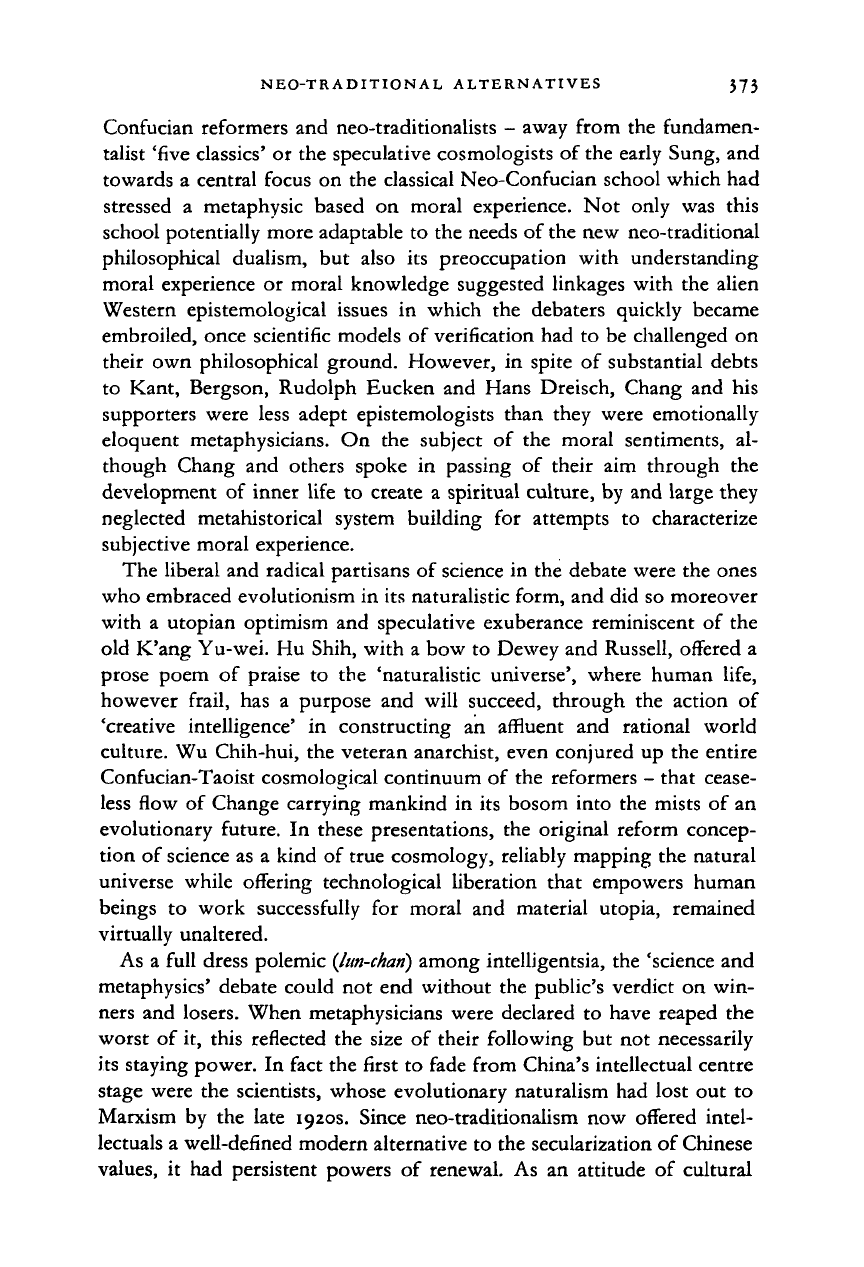
NEO-TRADITIONAL ALTERNATIVES 373
Confucian reformers and neo-traditionalists - away from the fundamen-
talist 'five classics' or the speculative cosmologists of the early Sung, and
towards a central focus on the classical Neo-Confucian school which had
stressed a metaphysic based on moral experience. Not only was this
school potentially more adaptable to the needs of the new neo-traditional
philosophical dualism, but also its preoccupation with understanding
moral experience or moral knowledge suggested linkages with the alien
Western epistemological issues in which the debaters quickly became
embroiled, once scientific models of verification had to be challenged on
their own philosophical ground. However, in spite of substantial debts
to Kant, Bergson, Rudolph Eucken and Hans Dreisch, Chang and his
supporters were less adept epistemologists than they were emotionally
eloquent metaphysicians. On the subject of the moral sentiments, al-
though Chang and others spoke in passing of their aim through the
development of inner life to create a spiritual culture, by and large they
neglected metahistorical system building for attempts to characterize
subjective moral experience.
The liberal and radical partisans of science in the debate were the ones
who embraced evolutionism in its naturalistic form, and did so moreover
with a Utopian optimism and speculative exuberance reminiscent of the
old K'ang Yu-wei. Hu Shih, with a bow to Dewey and Russell, offered a
prose poem of praise to the 'naturalistic universe', where human life,
however frail, has a purpose and will succeed, through the action of
'creative intelligence' in constructing an affluent and rational world
culture. Wu Chih-hui, the veteran anarchist, even conjured up the entire
Confucian-Taoist cosmological continuum of the reformers - that cease-
less flow of Change carrying mankind in its bosom into the mists of an
evolutionary future. In these presentations, the original reform concep-
tion of science as a kind of true cosmology, reliably mapping the natural
universe while offering technological liberation that empowers human
beings to work successfully for moral and material Utopia, remained
virtually unaltered.
As a full dress polemic
(lun-chan)
among intelligentsia, the 'science and
metaphysics' debate could not end without the public's verdict on win-
ners and losers. When metaphysicians were declared to have reaped the
worst of it, this reflected the size of their following but not necessarily
its staying power. In fact the first to fade from China's intellectual centre
stage were the scientists, whose evolutionary naturalism had lost out to
Marxism by the late 1920s. Since neo-traditionalism now offered intel-
lectuals a well-defined modern alternative to the secularization of Chinese
values, it had persistent powers of renewal. As an attitude of cultural
Cambridge Histories Online © Cambridge University Press, 2008
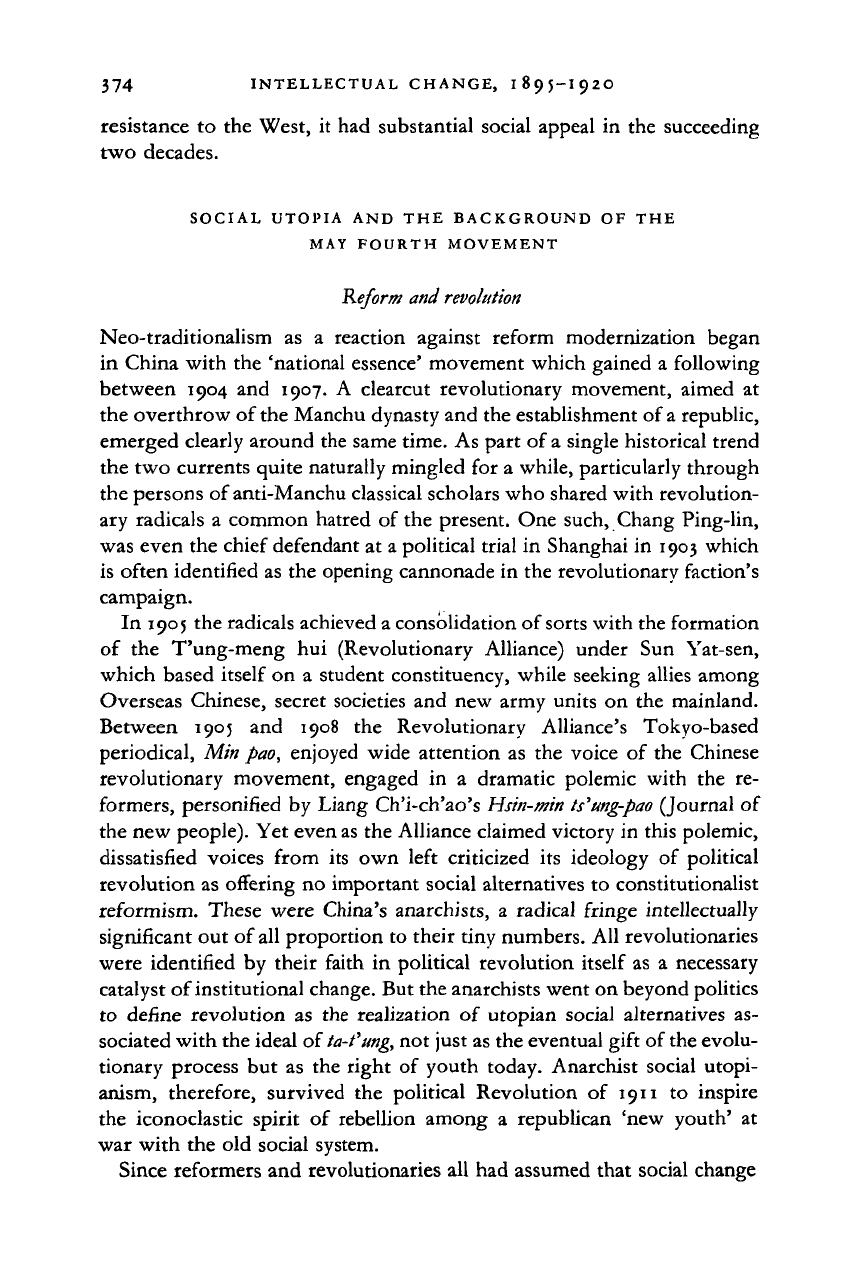
374 INTELLECTUAL CHANGE, 1895-I92O
resistance
to
the West,
it
had substantial social appeal
in
the succeeding
two decades.
SOCIAL UTOPIA AND THE BACKGROUND OF THE
MAY FOURTH MOVEMENT
Reform and
revolution
Neo-traditionalism
as a
reaction against reform modernization began
in China with the 'national essence' movement which gained
a
following
between 1904
and
1907.
A
clearcut revolutionary movement, aimed
at
the overthrow of the Manchu dynasty and the establishment of
a
republic,
emerged clearly around the same time. As part of a single historical trend
the two currents quite naturally mingled for a while, particularly through
the persons of anti-Manchu classical scholars who shared with revolution-
ary radicals
a
common hatred
of
the present. One such, Chang Ping-lin,
was even the chief defendant at a political trial in Shanghai in 1903 which
is often identified as the opening cannonade in the revolutionary faction's
campaign.
In 1905 the radicals achieved a consolidation of sorts with the formation
of
the
T'ung-meng
hui
(Revolutionary Alliance) under
Sun
Yat-sen,
which based itself on
a
student constituency, while seeking allies among
Overseas Chinese, secret societies and new army units
on
the mainland.
Between
1905 and 1908 the
Revolutionary Alliance's Tokyo-based
periodical, Min
pao,
enjoyed wide attention as the voice
of
the Chinese
revolutionary movement, engaged
in a
dramatic polemic with
the re-
formers, personified by Liang Ch'i-ch'ao's
Hsin-min ts'ung-pao
(Journal of
the new people). Yet even as the Alliance claimed victory in this polemic,
dissatisfied voices from
its
own left criticized
its
ideology
of
political
revolution as offering no important social alternatives to constitutionalist
reformism. These were China's anarchists,
a
radical fringe intellectually
significant out of
all
proportion to their tiny numbers. All revolutionaries
were identified
by
their faith
in
political revolution itself as
a
necessary
catalyst of institutional change. But the anarchists went on beyond politics
to define revolution
as
the realization
of
Utopian social alternatives as-
sociated with the ideal of
ta-t'ung,
not just as the eventual gift of the evolu-
tionary process but as the right
of
youth today. Anarchist social utopi-
anism, therefore, survived
the
political Revolution
of
1911
to
inspire
the iconoclastic spirit
of
rebellion among
a
republican 'new youth'
at
war with the old social system.
Since reformers and revolutionaries all had assumed that social change
Cambridge Histories Online © Cambridge University Press, 2008
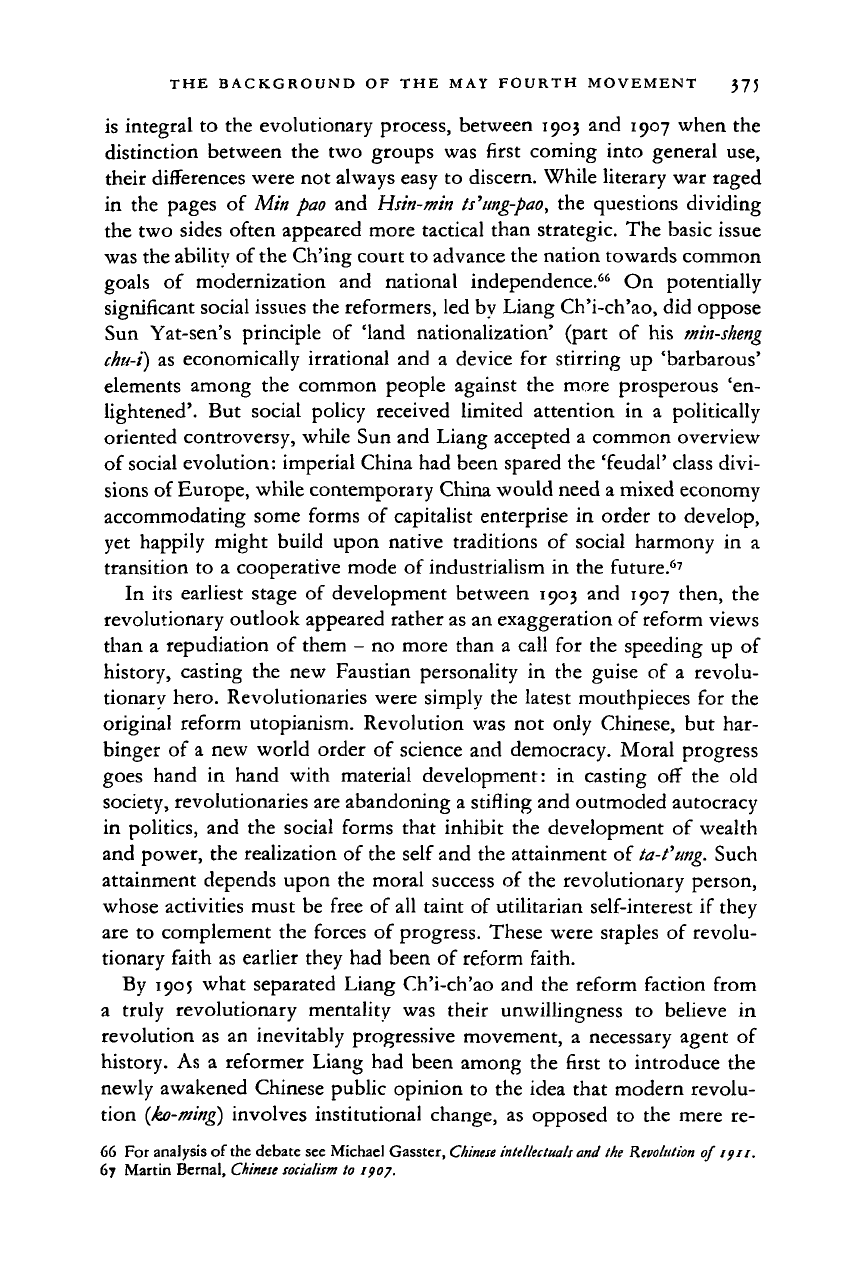
THE BACKGROUND OF THE MAY FOURTH MOVEMENT 375
is integral
to the
evolutionary process, between 1903
and
1907 when
the
distinction between
the two
groups
was
first coming into general
use,
their differences were not always easy
to
discern. While literary
war
raged
in
the
pages
of
Min pao
and
Hsin-min
ts'img-pao,
the
questions dividing
the
two
sides often appeared more tactical than strategic.
The
basic issue
was the ability of the Ch'ing court to advance the nation towards common
goals
of
modernization
and
national independence.
66
On
potentially
significant social issues the reformers, led
by
Liang Ch'i-ch'ao, did oppose
Sun Yat-sen's principle
of
'land nationalization' (part
of his
min-sheng
chu-i)
as
economically irrational
and a
device
for
stirring
up
'barbarous'
elements among
the
common people against
the
more prosperous
'en-
lightened'.
But
social policy received limited attention
in a
politically
oriented controversy, while Sun
and
Liang accepted
a
common overview
of social evolution: imperial China had been spared
the
'feudal' class divi-
sions
of
Europe, while contemporary China would need a mixed economy
accommodating some forms
of
capitalist enterprise
in
order
to
develop,
yet happily might build upon native traditions
of
social harmony
in a
transition
to a
cooperative mode
of
industrialism
in the
future.
67
In
its
earliest stage
of
development between 1903
and
1907 then,
the
revolutionary outlook appeared rather as
an
exaggeration
of
reform views
than
a
repudiation
of
them
- no
more than
a
call
for the
speeding
up of
history, casting
the new
Faustian personality
in the
guise
of a
revolu-
tionary hero. Revolutionaries were simply
the
latest mouthpieces
for the
original reform utopianism. Revolution
was not
only Chinese,
but har-
binger
of a new
world order
of
science
and
democracy. Moral progress
goes hand
in
hand with material development:
in
casting
off the old
society, revolutionaries are abandoning a stifling and outmoded autocracy
in politics,
and the
social forms that inhibit
the
development
of
wealth
and power,
the
realization
of
the self and
the
attainment
of
ta-t'ung.
Such
attainment depends upon
the
moral success
of
the revolutionary person,
whose activities must
be
free
of
all taint
of
utilitarian self-interest
if
they
are
to
complement
the
forces
of
progress. These were staples
of
revolu-
tionary faith
as
earlier they
had
been
of
reform faith.
By 1905 what separated Liang Ch'i-ch'ao
and the
reform faction from
a truly revolutionary mentality
was
their unwillingness
to
believe
in
revolution
as an
inevitably progressive movement,
a
necessary agent
of
history.
As a
reformer Liang
had
been among
the
first
to
introduce
the
newly awakened Chinese public opinion
to the
idea that modern revolu-
tion
(ko-ming)
involves institutional change,
as
opposed
to the
mere
re-
66
For
analysis
of
the debate see Michael Gasster,
Chinese intellectuals
and the
Revolution
of
1911.
67 Martin Bernal,
Chinese socialism
to 190J.
Cambridge Histories Online © Cambridge University Press, 2008
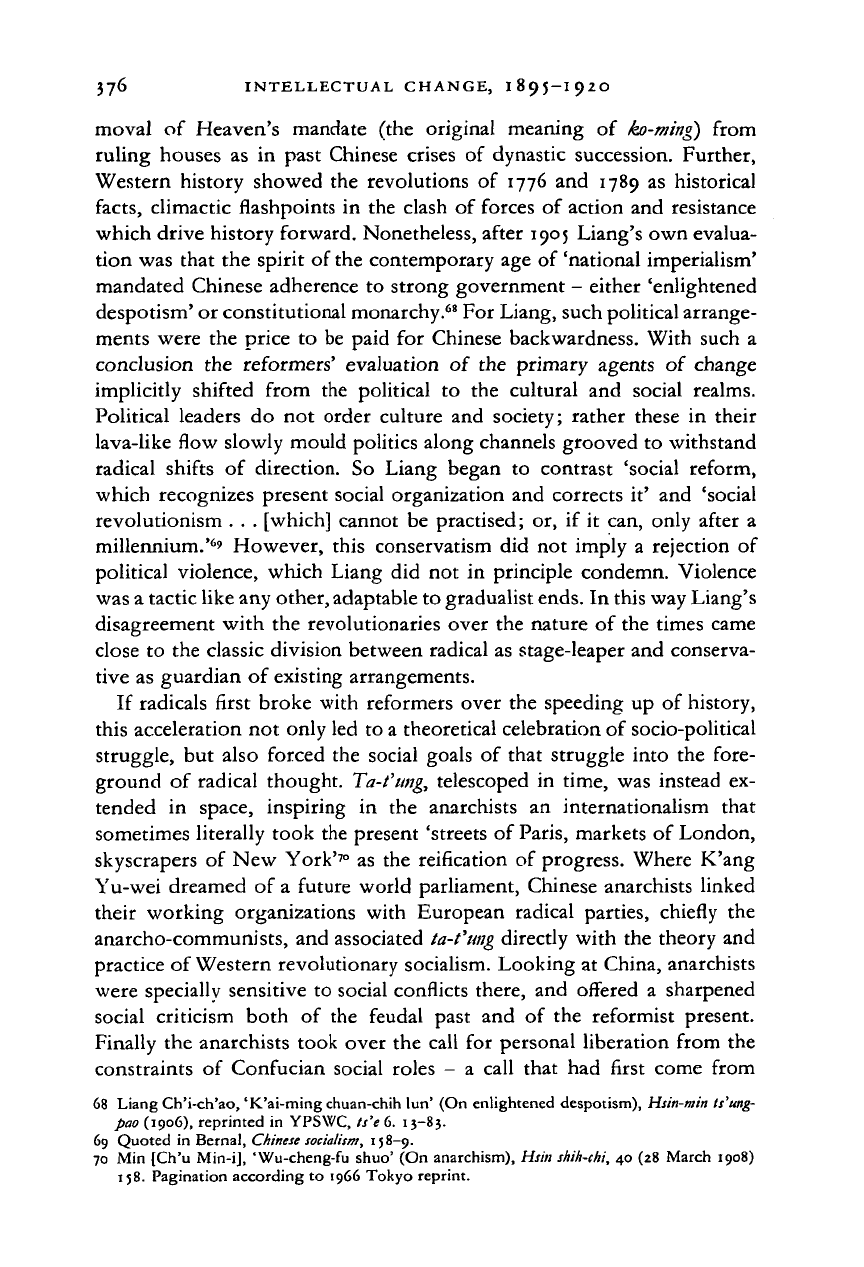
376 INTELLECTUAL CHANGE, 1895-192O
moval
of
Heaven's mandate (the original meaning
of
ko-ming) from
ruling houses
as in
past Chinese crises
of
dynastic succession. Further,
Western history showed the revolutions
of
1776 and 1789 as historical
facts,
climactic flashpoints
in
the clash of forces of action and resistance
which drive history forward. Nonetheless, after 1905 Liang's own evalua-
tion was that the spirit of the contemporary age of 'national imperialism'
mandated Chinese adherence to strong government
-
either 'enlightened
despotism' or constitutional monarchy.
68
For Liang, such political arrange-
ments were the price
to
be paid for Chinese backwardness. With such
a
conclusion the reformers' evaluation
of
the primary agents
of
change
implicitly shifted from
the
political
to the
cultural and social realms.
Political leaders
do
not order culture and society; rather these
in
their
lava-like flow slowly mould politics along channels grooved to withstand
radical shifts
of
direction.
So
Liang began
to
contrast 'social reform,
which recognizes present social organization and corrects it' and 'social
revolutionism
. . .
[which] cannot be practised; or,
if it
can, only after
a
millennium.'
6
' However, this conservatism did not imply
a
rejection of
political violence, which Liang did not
in
principle condemn. Violence
was a tactic like any other, adaptable to gradualist
ends.
In this way Liang's
disagreement with the revolutionaries over the nature of the times came
close to the classic division between radical as stage-leaper and conserva-
tive as guardian of existing arrangements.
If radicals first broke with reformers over the speeding up of history,
this acceleration not only led to a theoretical celebration of socio-political
struggle, but also forced the social goals
of
that struggle into the fore-
ground
of
radical thought. Ta-t'ung, telescoped
in
time, was instead ex-
tended
in
space, inspiring
in the
anarchists
an
internationalism that
sometimes literally took the present 'streets of Paris, markets of London,
skyscrapers
of
New York'
70
as the reification of progress. Where K'ang
Yu-wei dreamed of a future world parliament, Chinese anarchists linked
their working organizations with European radical parties, chiefly
the
anarcho-communists, and associated
ta-t'ung
directly with the theory and
practice of Western revolutionary socialism. Looking at China, anarchists
were specially sensitive to social conflicts there, and offered
a
sharpened
social criticism both
of
the feudal past and
of
the reformist present.
Finally the anarchists took over the call for personal liberation from the
constraints
of
Confucian social roles
- a
call that had first come from
68 Liang Ch'i-ch'ao, 'K'ai-ming chuan-chih lun' (On enlightened despotism), Hsin-min Is'ung-
pao (1906), reprinted
in
YPSWC, ts'e 6.
13-83.
69 Quoted
in
Bernal,
Chinese
socialism,
158-9.
70 Min [Ch'u
Min-i],
'Wu-cheng-fu shuo' (On anarchism), Hsin shih-chi, 40 (28 March 1908)
158.
Pagination according
to
1966 Tokyo reprint.
Cambridge Histories Online © Cambridge University Press, 2008
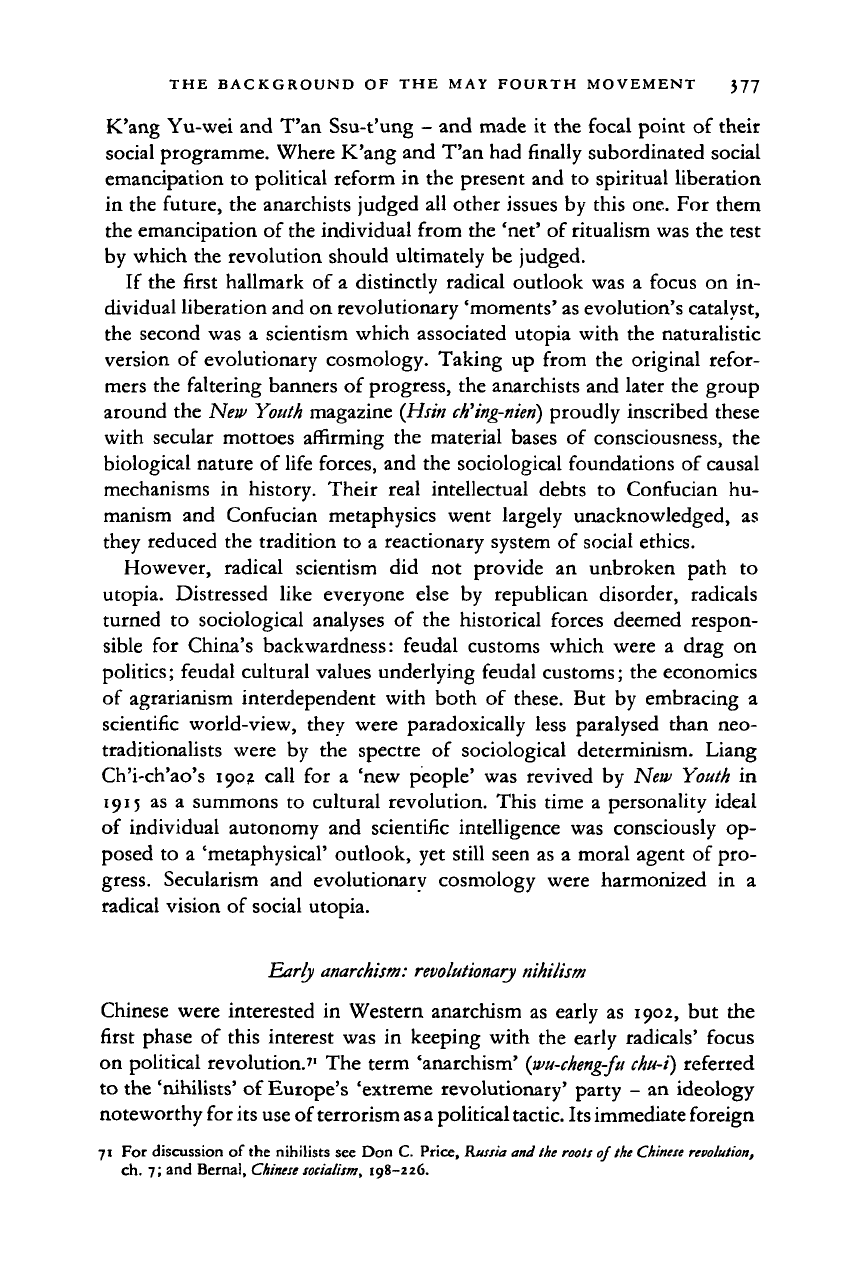
THE BACKGROUND OF THE MAY FOURTH MOVEMENT 377
K'ang Yu-wei and T'an Ssu-t'ung
-
and made
it
the focal point
of
their
social programme. Where K'ang and T'an had finally subordinated social
emancipation to political reform in the present and to spiritual liberation
in the future, the anarchists judged all other issues by this one. For them
the emancipation of the individual from the 'net' of ritualism was the test
by which the revolution should ultimately be judged.
If the first hallmark
of
a distinctly radical outlook was
a
focus
on
in-
dividual liberation and on revolutionary 'moments' as evolution's catalyst,
the second was
a
scientism which associated Utopia with the naturalistic
version
of
evolutionary cosmology. Taking
up
from the original refor-
mers the faltering banners of progress, the anarchists and later the group
around the New
Youth
magazine
{Hsin ch'ing-nien)
proudly inscribed these
with secular mottoes affirming
the
material bases
of
consciousness,
the
biological nature of life forces, and the sociological foundations of causal
mechanisms
in
history. Their real intellectual debts
to
Confucian
hu-
manism
and
Confucian metaphysics went largely unacknowledged,
as
they reduced the tradition to
a
reactionary system
of
social ethics.
However, radical scientism
did not
provide
an
unbroken path
to
Utopia. Distressed like everyone else
by
republican disorder, radicals
turned
to
sociological analyses
of
the historical forces deemed respon-
sible
for
China's backwardness: feudal customs which were
a
drag
on
politics; feudal cultural values underlying feudal customs; the economics
of agrarianism interdependent with both
of
these. But
by
embracing
a
scientific world-view, they were paradoxically less paralysed than neo-
traditionalists were
by the
spectre
of
sociological determinism. Liang
Ch'i-ch'ao's 190? call
for a
'new people' was revived
by
New Youth
in
1915 as
a
summons
to
cultural revolution. This time
a
personality ideal
of individual autonomy
and
scientific intelligence was consciously
op-
posed
to a
'metaphysical' outlook, yet still seen as
a
moral agent of pro-
gress.
Secularism
and
evolutionary cosmology were harmonized
in a
radical vision of social Utopia.
Early
anarchism:
revolutionary
nihilism
Chinese were interested
in
Western anarchism
as
early as 1902, but the
first phase
of
this interest was
in
keeping with the early radicals' focus
on political revolution.
71
The term 'anarchism'
(wu-cheng-fu chu-i)
referred
to the 'nihilists' of Europe's 'extreme revolutionary' party
-
an ideology
noteworthy for
its
use of terrorism
as a
political
tactic.
Its
immediate foreign
71 For discussion
of
the nihilists see Don C. Price, Russia and
the roots
of
the Chinese
revolution,
ch.
7; and Bernal,
Chinese
socialism,
198-226.
Cambridge Histories Online © Cambridge University Press, 2008
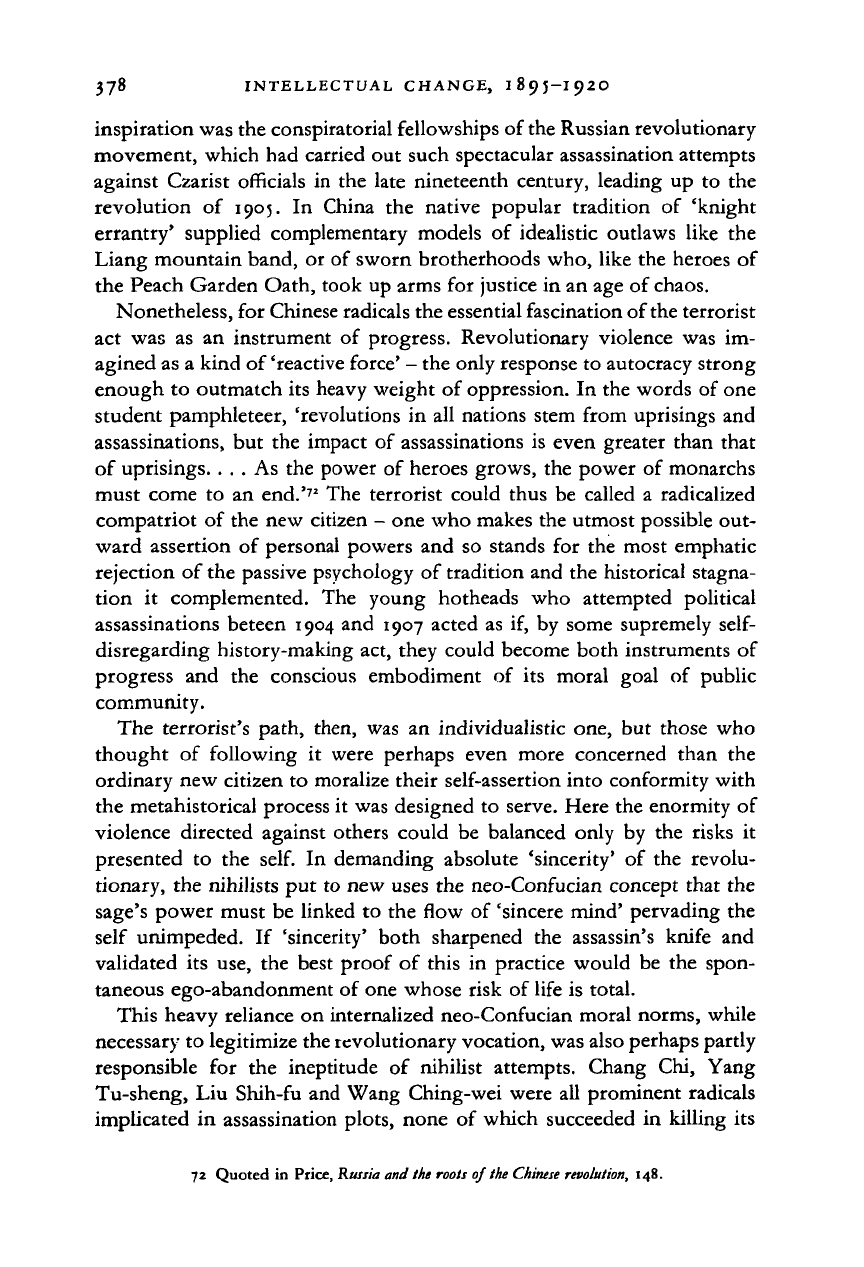
378 INTELLECTUAL CHANGE, 1895-192O
inspiration was
the
conspiratorial fellowships
of
the Russian revolutionary
movement, which
had
carried
out
such spectacular assassination attempts
against Czarist officials
in
the
late nineteenth century, leading
up to
the
revolution
of
1905.
In
China
the
native popular tradition
of
'knight
errantry' supplied complementary models
of
idealistic outlaws like
the
Liang mountain band,
or of
sworn brotherhoods who, like
the
heroes
of
the Peach Garden Oath, took
up
arms
for
justice
in an age of
chaos.
Nonetheless,
for
Chinese radicals
the
essential fascination of the terrorist
act
was
as an
instrument
of
progress. Revolutionary violence
was im-
agined as
a
kind
of
'reactive force'
-
the
only response
to
autocracy strong
enough
to
outmatch
its
heavy weight
of
oppression.
In the
words
of one
student pamphleteer, 'revolutions
in all
nations stem from uprisings
and
assassinations,
but the
impact
of
assassinations
is
even greater than that
of uprisings.
...
As the
power
of
heroes grows,
the
power
of
monarchs
must come
to an
end.'
72
The
terrorist could thus
be
called
a
radicalized
compatriot
of
the new
citizen
-
one who
makes
the
utmost possible
out-
ward assertion
of
personal powers
and
so
stands
for
the
most emphatic
rejection
of
the passive psychology
of
tradition
and the
historical stagna-
tion
it
complemented.
The
young hotheads
who
attempted political
assassinations beteen 1904
and 1907
acted
as
if,
by
some supremely
self-
disregarding history-making
act,
they could become both instruments
of
progress
and the
conscious embodiment
of its
moral goal
of
public
community.
The terrorist's path, then,
was
an
individualistic
one, but
those
who
thought
of
following
it
were perhaps even more concerned than
the
ordinary
new
citizen
to
moralize their self-assertion into conformity with
the metahistorical process
it
was
designed
to
serve. Here
the
enormity
of
violence directed against others could
be
balanced only
by
the
risks
it
presented
to the
self.
In
demanding absolute 'sincerity'
of
the
revolu-
tionary,
the
nihilists
put to new
uses
the
neo-Confucian concept that
the
sage's power must
be
linked
to the
flow
of
'sincere mind' pervading
the
self unimpeded.
If
'sincerity' both sharpened
the
assassin's knife
and
validated
its
use, the
best proof
of
this
in
practice would
be
the
spon-
taneous ego-abandonment
of
one
whose risk
of
life
is
total.
This heavy reliance
on
internalized neo-Confucian moral norms, while
necessary
to
legitimize the revolutionary vocation, was also perhaps partly
responsible
for the
ineptitude
of
nihilist attempts. Chang
Chi,
Yang
Tu-sheng,
Liu
Shih-fu
and
Wang Ching-wei were
all
prominent radicals
implicated
in
assassination plots, none
of
which succeeded
in
killing
its
72 Quoted
in
Price, Russia and
the
roots
of
the Chinese
revolution,
148.
Cambridge Histories Online © Cambridge University Press, 2008
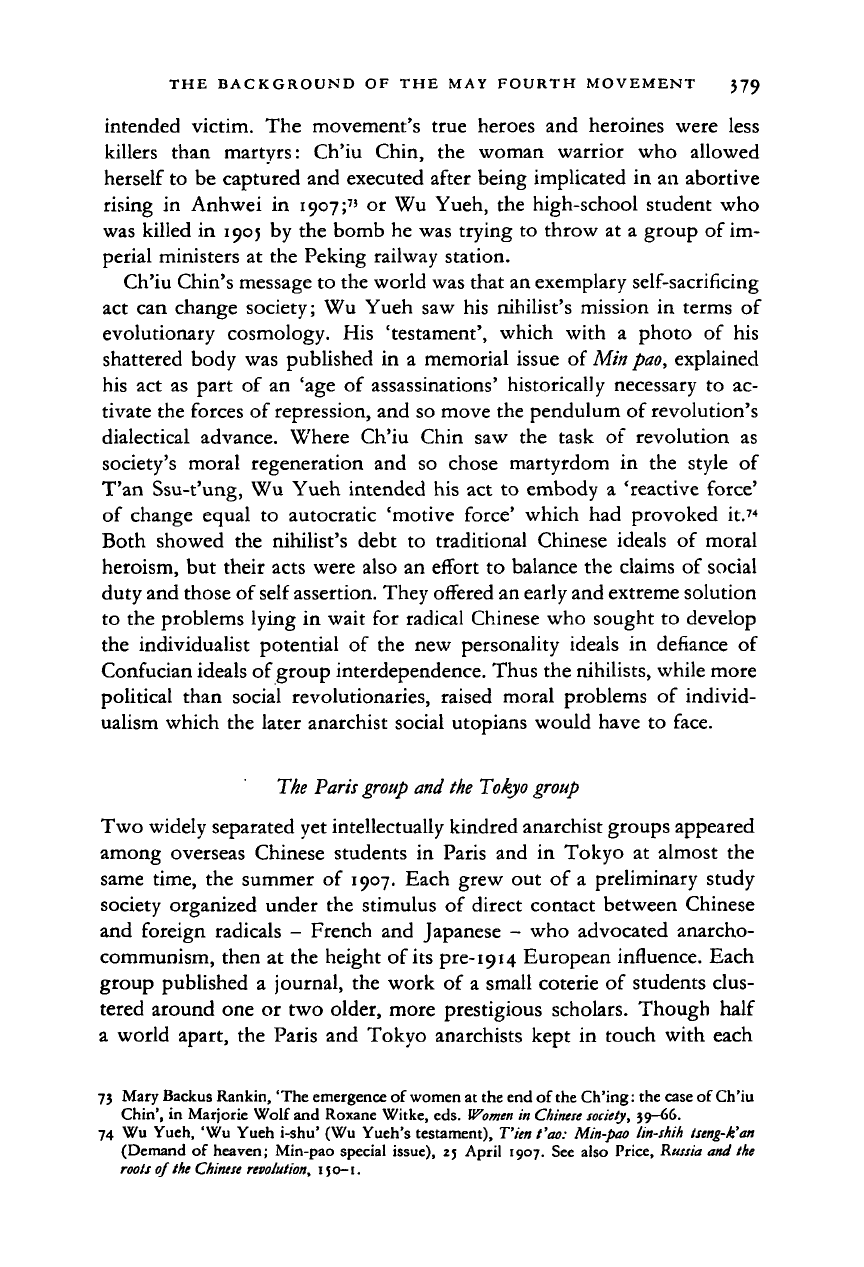
THE BACKGROUND OF THE MAY FOURTH MOVEMENT 579
intended victim. The movement's true heroes and heroines were less
killers than martyrs: Ch'iu Chin, the woman warrior who allowed
herself to be captured and executed after being implicated in an abortive
rising in Anhwei in 1907;" or Wu Yueh, the high-school student who
was killed in 1905 by the bomb he was trying to throw at a group of im-
perial ministers at the Peking railway station.
Ch'iu Chin's message to the world was that an exemplary self-sacrificing
act can change society; Wu Yueh saw his nihilist's mission in terms of
evolutionary cosmology. His 'testament', which with a photo of his
shattered body was published in a memorial issue of Min
pao,
explained
his act as part of an 'age of assassinations' historically necessary to ac-
tivate the forces of repression, and so move the pendulum of revolution's
dialectical advance. Where Ch'iu Chin saw the task of revolution as
society's moral regeneration and so chose martyrdom in the style of
T'an Ssu-t'ung, Wu Yueh intended his act to embody a 'reactive force'
of change equal to autocratic 'motive force' which had provoked it.
74
Both showed the nihilist's debt to traditional Chinese ideals of moral
heroism, but their acts were also an effort to balance the claims of social
duty and those of self assertion. They offered an early and extreme solution
to the problems lying in wait for radical Chinese who sought to develop
the individualist potential of the new personality ideals in defiance of
Confucian ideals of group interdependence. Thus the nihilists, while more
political than social revolutionaries, raised moral problems of individ-
ualism which the later anarchist social Utopians would have to face.
The Paris
group
and the Tokyo group
Two widely separated yet intellectually kindred anarchist groups appeared
among overseas Chinese students in Paris and in Tokyo at almost the
same time, the summer of 1907. Each grew out of a preliminary study
society organized under the stimulus of direct contact between Chinese
and foreign radicals - French and Japanese - who advocated anarcho-
communism, then at the height of its pre-1914 European influence. Each
group published a journal, the work of a small coterie of students clus-
tered around one or two older, more prestigious scholars. Though half
a world apart, the Paris and Tokyo anarchists kept in touch with each
73 Mary Backus Rankin, 'The emergence of women at the end of the Ch'ing: the case of Ch'iu
Chin', in Marjorie Wolf and Roxane Witke, eds.
Women
in
Chinese
society,
39—66.
74 Wu Yueh, 'Wu Yueh i-shu' (Wu Yueh's testament), Tien I'ao: Min-pao lin-shih tseng-k'an
(Demand of heaven; Min-pao special issue), 25 April 1907. See also Price, Russia and the
roots of the Chinese revolution,
150-1.
Cambridge Histories Online © Cambridge University Press, 2008
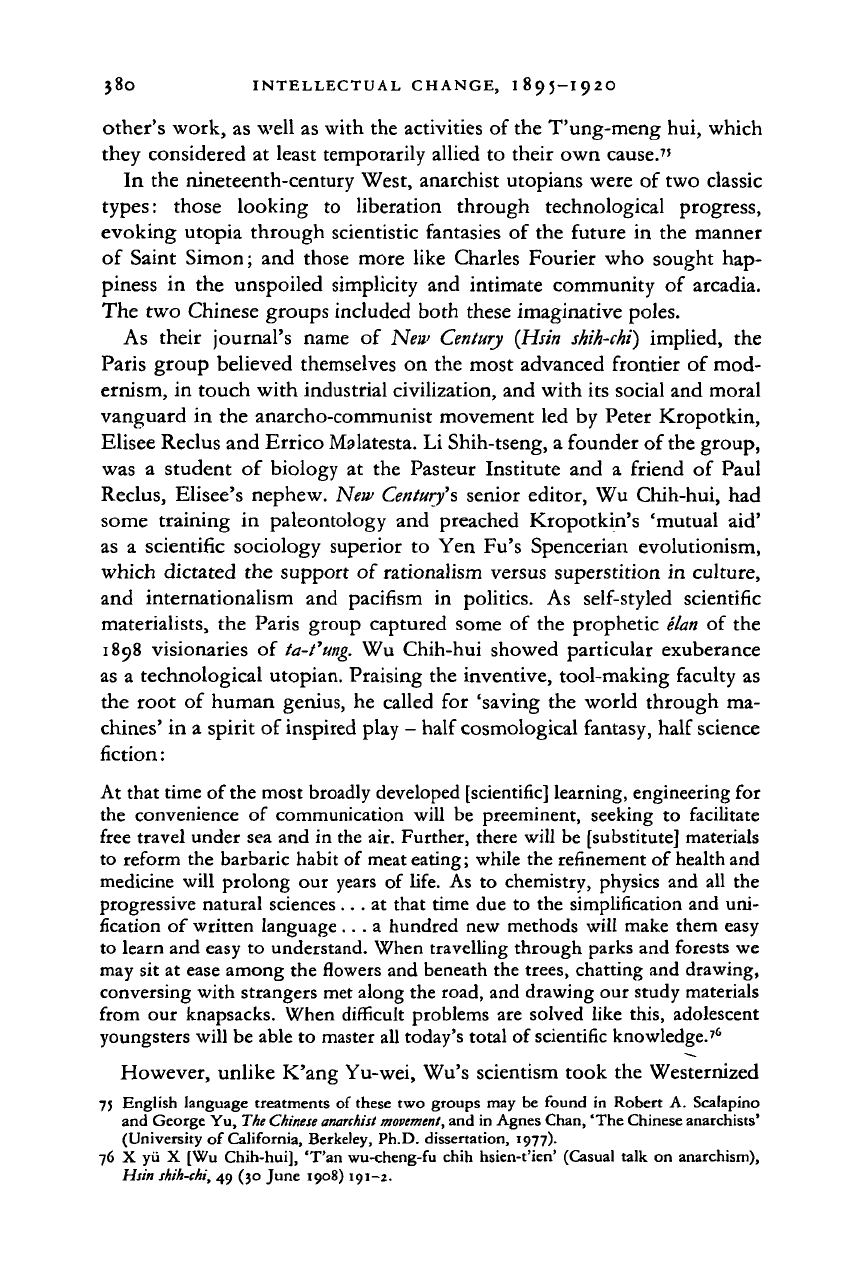
380 INTELLECTUAL CHANGE, 1895-I92O
other's work, as well as with the activities of the T'ung-meng hui, which
they considered at least temporarily allied to their own cause."
In the nineteenth-century West, anarchist Utopians were of two classic
types:
those looking
to
liberation through technological progress,
evoking Utopia through scientistic fantasies of the future in the manner
of Saint Simon; and those more like Charles Fourier who sought hap-
piness
in
the unspoiled simplicity and intimate community
of
arcadia.
The two Chinese groups included both these imaginative poles.
As their journal's name
of
New
Century
(Jisin
shih-chi)
implied,
the
Paris group believed themselves on the most advanced frontier of mod-
ernism, in touch with industrial civilization, and with its social and moral
vanguard in the anarcho-communist movement led by Peter Kropotkin,
Elisee Reclus and Errico Malatesta. Li Shih-tseng, a founder of the group,
was
a
student
of
biology
at
the Pasteur Institute and
a
friend
of
Paul
Reclus, Elisee's nephew. New
Century's
senior editor, Wu Chih-hui, had
some training
in
paleontology and preached Kropotkin's 'mutual aid'
as
a
scientific sociology superior
to
Yen Fu's Spencerian evolutionism,
which dictated the support of rationalism versus superstition in culture,
and internationalism and pacifism
in
politics.
As
self-styled scientific
materialists, the Paris group captured some
of
the prophetic
elan
of the
1898 visionaries
of
ta-fung. Wu Chih-hui showed particular exuberance
as
a
technological Utopian. Praising the inventive, tool-making faculty as
the root
of
human genius, he called for 'saving the world through ma-
chines' in a spirit of inspired play
-
half cosmological fantasy, half science
fiction:
At that time of the most broadly developed [scientific] learning, engineering for
the convenience
of
communication will be preeminent, seeking
to
facilitate
free travel under sea and in the air. Further, there will be [substitute] materials
to reform the barbaric habit of meat eating; while the refinement of health and
medicine will prolong our years of life. As to chemistry, physics and all the
progressive natural sciences... at that time due to the simplification and uni-
fication of written language ... a hundred new methods will make them easy
to learn and easy to understand. When travelling through parks and
forests
we
may sit at ease among the
flowers
and beneath the trees, chatting and drawing,
conversing with strangers met along the road, and drawing our study materials
from our knapsacks. When difficult problems are solved like this, adolescent
youngsters will be able to master all today's total of scientific knowledge.
76
However, unlike K'ang Yu-wei, Wu's scientism took the Westernized
75
English language treatments of these two groups may be found
in
Robert A. Scalapino
and
George Yu, The
Chinese anarchist
movement,
and in Agnes Chan, 'The Chinese
anarchists'
(University
of California, Berkeley, Ph.D. dissertation,
1977).
76
X
yii
X
[Wu
Chih-hui],
'T'an wu-cheng-fu chih hsien-t'ien' (Casual talk on
anarchism),
Hsin
shih-chi,
49 (30 June 1908)
191-2.
Cambridge Histories Online © Cambridge University Press, 2008
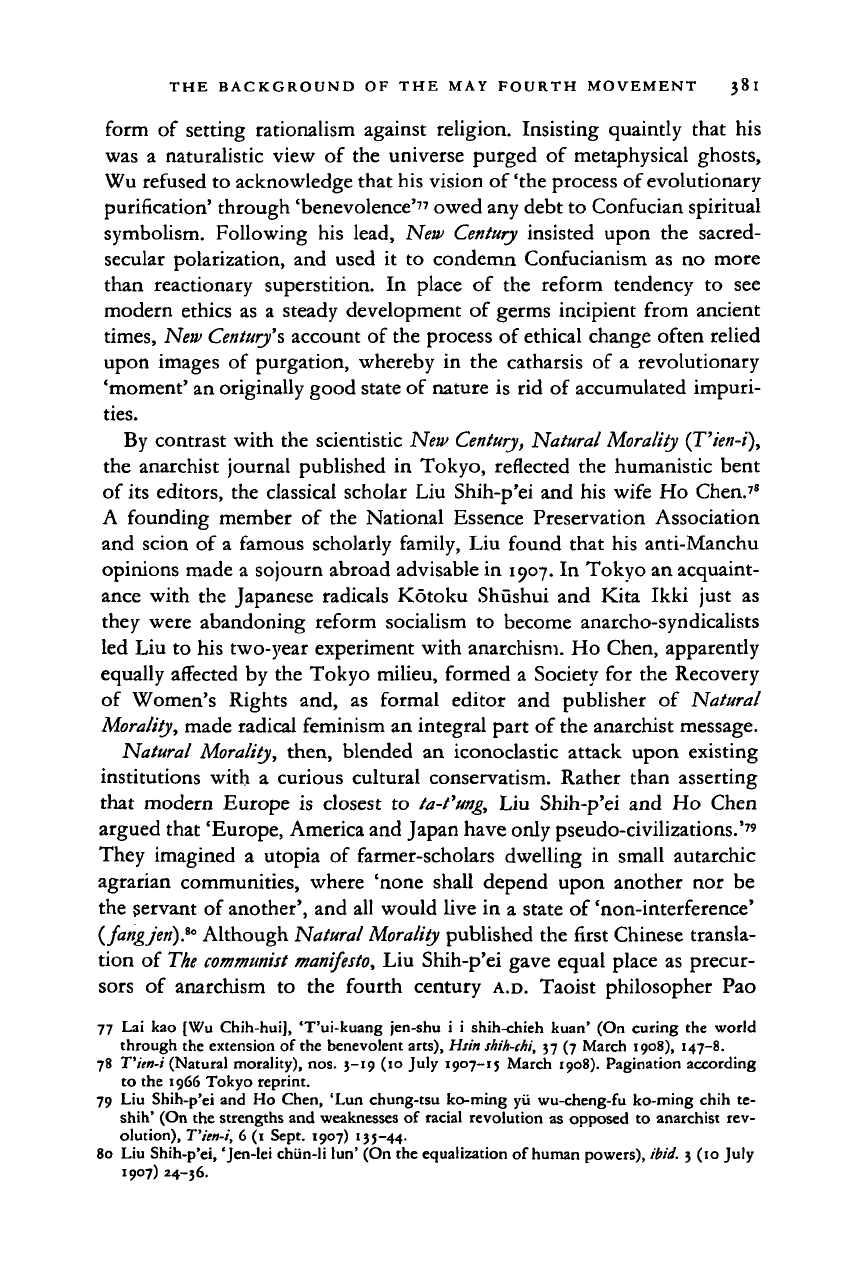
THE BACKGROUND OF THE MAY FOURTH MOVEMENT 381
form of setting rationalism against religion. Insisting quaintly that his
was a naturalistic view of the universe purged of metaphysical ghosts,
Wu refused to acknowledge that his vision of'the process of evolutionary
purification' through 'benevolence'
77
owed any debt to Confucian spiritual
symbolism. Following his lead, New
Century
insisted upon the sacred-
secular polarization, and used it to condemn Confucianism as no more
than reactionary superstition. In place of the reform tendency to see
modern ethics as a steady development of germs incipient from ancient
times,
New
Century's
account of the process of ethical change often relied
upon images of purgation, whereby in the catharsis of a revolutionary
'moment' an originally good state of nature is rid of accumulated impuri-
ties.
By contrast with the scientistic New
Century,
Natural
Morality
(T'ien-i),
the anarchist journal published in Tokyo, reflected the humanistic bent
of its editors, the classical scholar Liu Shih-p'ei and his wife Ho Chen.
78
A founding member of the National Essence Preservation Association
and scion of a famous scholarly family, Liu found that his anti-Manchu
opinions made a sojourn abroad advisable in 1907. In Tokyo an acquaint-
ance with the Japanese radicals Kotoku Shushui and Kita Ikki just as
they were abandoning reform socialism to become anarcho-syndicalists
led Liu to his two-year experiment with anarchism. Ho Chen, apparently
equally affected by the Tokyo milieu, formed a Society for the Recovery
of Women's Rights and, as formal editor and publisher of Natural
Morality,
made radical feminism an integral part of the anarchist message.
Natural Morality, then, blended an iconoclastic attack upon existing
institutions with a curious cultural conservatism. Rather than asserting
that modern Europe is closest to ta-t'ung, Liu Shih-p'ei and Ho Chen
argued that 'Europe, America and Japan have only pseudo-civilizations.'
79
They imagined a Utopia of farmer-scholars dwelling in small autarchic
agrarian communities, where 'none shall depend upon another nor be
the servant of another', and all would live in a state of 'non-interference'
(fangjeri)}
0
Although Natural
Morality
published the first Chinese transla-
tion of
The communist
manifesto,
Liu Shih-p'ei gave equal place as precur-
sors of anarchism to the fourth century
A.D.
Taoist philosopher Pao
77 Lai kao [Wu Chih-hui], 'T'ui-kuang jen-shu i i shih-chieh kuan* (On curing the world
through the extension of the benevolent arts), Hsin
shih-chi,
37 (7 March 1908), 147-8.
78
T'ien-i
(Natural morality), nos. 3-19 (10 July 1907-15 March 1908). Pagination according
to the 1966 Tokyo reprint.
79 Liu Shih-p'ei and Ho Chen, 'Lun chung-tsu ko-ming yii wu-cheng-fu ko-ming chih te-
shih'
(On the strengths and weaknesses of racial revolution as opposed to anarchist rev-
olution),
T'ien-i,
6 (1 Sept. 1907) 135-44.
80 Liu Shih-p'ei, 'Jen-lei chiin-li lun' (On the equalization of human powers),
ibid.
3 (10 July
1907) 24-36.
Cambridge Histories Online © Cambridge University Press, 2008
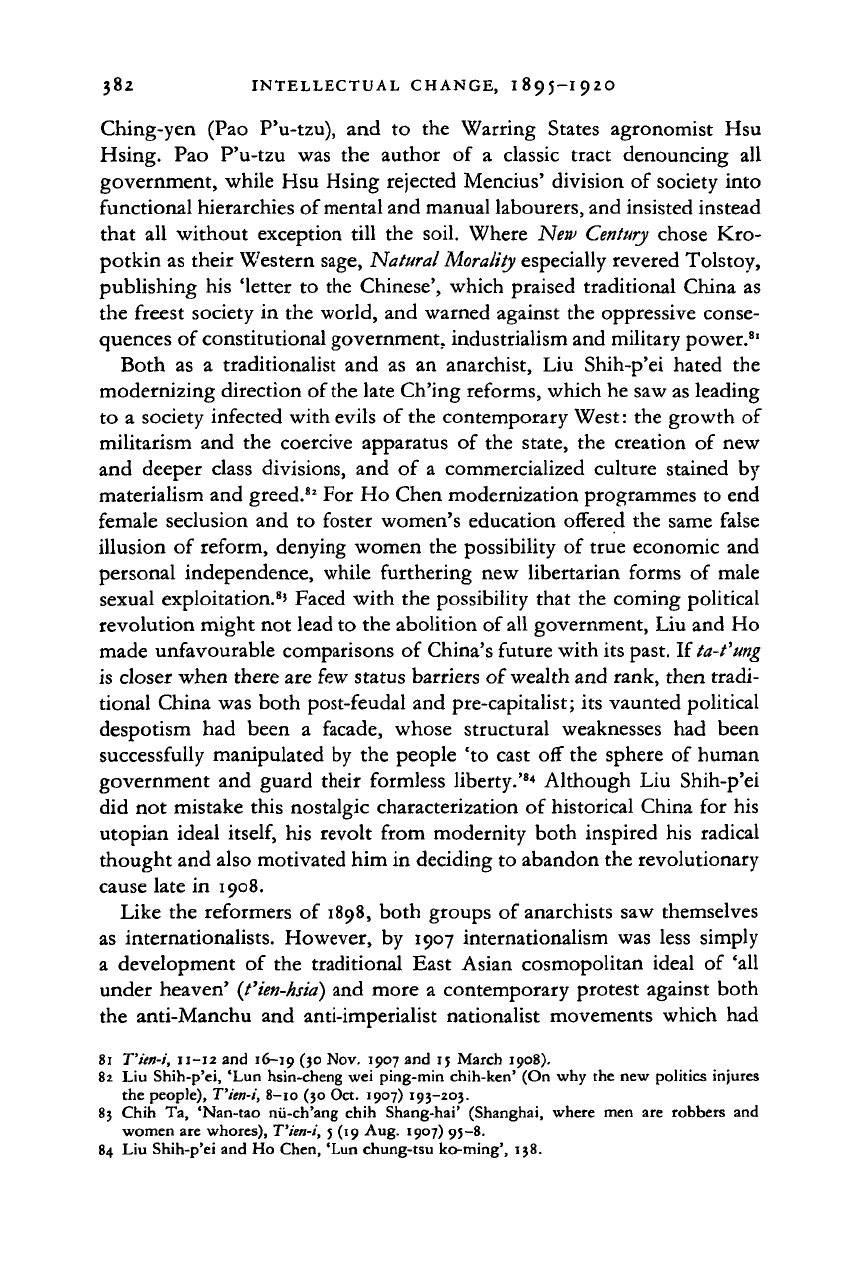
382 INTELLECTUAL CHANGE, 1895-I92O
Ching-yen (Pao P'u-tzu),
and to the
Warring States agronomist
Hsu
Hsing.
Pao
P'u-tzu was
the
author
of a
classic tract denouncing
all
government, while Hsu Hsing rejected Mencius' division
of
society into
functional hierarchies of mental and manual labourers, and insisted instead
that
all
without exception till
the
soil. Where New
Century
chose Kro-
potkin as their Western sage, Natural
Morality
especially revered Tolstoy,
publishing his 'letter
to
the Chinese', which praised traditional China
as
the freest society in the world, and warned against the oppressive conse-
quences of constitutional government, industrialism and military power.
81
Both
as a
traditionalist and
as an
anarchist,
Liu
Shih-p'ei hated
the
modernizing direction of
the
late Ch'ing reforms, which he saw as leading
to
a
society infected with evils of the contemporary West: the growth of
militarism and the coercive apparatus
of
the state,
the
creation
of
new
and deeper class divisions, and
of a
commercialized culture stained
by
materialism and greed.
82
For Ho Chen modernization programmes to end
female seclusion and
to
foster women's education offered the same false
illusion
of
reform, denying women the possibility
of
true economic and
personal independence, while furthering new libertarian forms
of
male
sexual exploitation.
8
' Faced with the possibility that the coming political
revolution might not lead to the abolition of all government, Liu and Ho
made unfavourable comparisons
of
China's future with its past. If
ta-t'ung
is closer when there are few status barriers of wealth and rank, then tradi-
tional China was both post-feudal and pre-capitalist; its vaunted political
despotism
had
been
a
facade, whose structural weaknesses
had
been
successfully manipulated by the people
'to
cast off the sphere
of
human
government and guard their formless liberty.'
8
" Although Liu Shih-p'ei
did not mistake this nostalgic characterization of historical China for his
Utopian ideal
itself,
his revolt from modernity both inspired his radical
thought and also motivated him in deciding to abandon the revolutionary
cause late in 1908.
Like the reformers
of
1898, both groups of anarchists saw themselves
as internationalists. However,
by
1907 internationalism was less simply
a development
of
the traditional East Asian cosmopolitan ideal
of
'all
under heaven'
(t'ien-hsia)
and more
a
contemporary protest against both
the anti-Manchu and anti-imperialist nationalist movements which had
81
T'ien-i, 11-12 and 16-19 (3° Nov. 1907 and 15 March
1908).
82
Liu Shih-p'ei, 'Lun hsin-cheng wei ping-min
chih-ken'
(On why the new politics injures
the
people),
T'ien-i, 8-10 (30 Oct. 1907)
193-203.
83
Chih
Ta,
'Nan-tao nii-ch'ang chih Shang-hai' (Shanghai, where men
are
robbers and
women
are
whores),
T'ien-i, 5 (19 Aug. 1907) 95-8.
84
Liu Shih-p'ei and Ho
Chen,
'Lun chung-tsu
ko-ming',
138.
Cambridge Histories Online © Cambridge University Press, 2008
